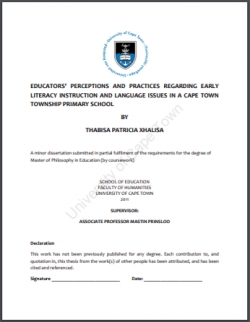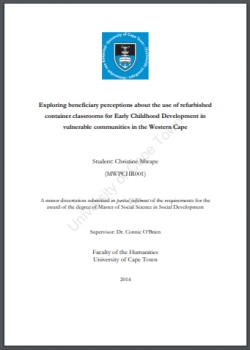Educators' perceptions about the learners with barriers to learning and development

Type
Thesis
Authors
Category
ECCE, Foundation, Intermediate
[ Browse Items ]
Publication Year
2007
Publisher
North West University, Potchefstroom, South Africa
URL
[ private ]
Pages
135 p.
Subject
Early childhood education, Primary education, Foundation Phase, Intermediate Phase, Special schools, Inclusive education, Learners, Barriers to learning, Teachers, Educators, Teacher attitudes, Teacher training, South Africa
Abstract
The introduction of Inclusive Education in South Africa was part of the democratisation of the country and was in line with international trends. Based on the Constitution, the South African government produced a policy document aimed at meeting the needs of learners with barriers to learning, the underlying principle of which was inclusion. The South African Schools Act was passed, clearly stating that a public school must admit learners and serve their educational requirements, without unfairly discriminating in any way. Based on the rights that all learners have, including those with barriers to learning, no learner can be turned away from a public school based on any discrimination. Previously teachers referred learners with barriers to learning to special schools, as they did not see them belonging to the mainstream. The purpose of this study was to identify the educators' perceptions about learners with barriers to learning and development and how this may affect the implementation of Inclusive Education. The survey method was used to identify the educators' perceptions about learners with barriers to learning and development and how this may affect the implementation of Inclusive Education. More detailed information on the essential aspects for successful implementation of inclusive education was collected through the use of questionnaire and interviews. Fifty-eight participants were chosen randomly and four special school educators and ten education regional officials were purposively included as participants. The participants completed the questionnaires, and interviews were used to obtain response clarity or additional information. The collected data were analysed and categorised into themes. From the analysis of the data, it became apparent that inclusive education requires new skills, knowledge and attitudes from the educators and, therefore, educator education and training should be revisited and designed to accommodate and support inclusion. Educators also agreed that there must be collaboration between the mainstream educators and specialised personnel such as therapists and education specialists from the Department of Education for successful inclusion to be able to address barriers to learning.
Number of Copies
1
| Library | Accession No | Call No | Copy No | Edition | Location | Availability |
|---|---|---|---|---|---|---|
| 1 | Potchefstroom, North West Province, South Africa | Yes |

